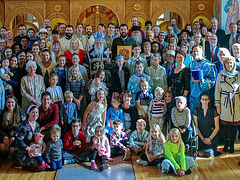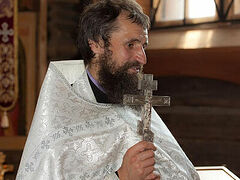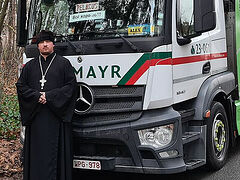The Russian Orthodox Mission in Mexico is very active. Its members help each other and those around them with prayer and words; and those who are in real trouble, with money, medicine, and legal support.
The moving power, heart, and soul of this mission is the abbot of the Russian Holy Trinity Monastery in Mexico City, Archimandrite Nektary (Haji-Petropoulos). When some mutual acquaintances introduced him to me, saying he is a righteous man, I confess I took this as just a personal perception. When I watched a film about the numerous amazing activities undertaken by this monk, I took it as a call for help.
But after a personal conversation with him I suddenly felt as if something had turned in me and I wanted to act. Fr. Nektary himself chose a video interview format, and only later did I realize how important it was for me not only to hear his voice, but also to see this man’s eyes. For over an hour he spoke measuredly and thoughtfully about his path to Russian Orthodoxy, Metropolitan Laurus (Skurla), the Russian Mission in Mexico and its life, and only then did I think: “How has he managed to find time for a talk, with his busy schedule?” Indeed, in order to support the mission he works at three secular jobs twenty-one hours a day seven days a week.
I am sure that Fr. Nektary took it as an obedience to tell an unknown journalist not about himself, but about the church. Only later did I realize that Fr. Nektary had given me no dates, perhaps because he lives for eternity.
I knew that he has repeatedly received death threats from bandits and therefore could not move freely and safely around the country. In this regard, I immediately told him that he could interrupt me any moment if it seemed dangerous. Fr. Nektary nodded, but then… answered all my questions.
This is part 1 of his story: on the life of the Russian Orthodox Mission in Mexico.
 Archimandrite Nektary (Haji-Petropoulos)
Archimandrite Nektary (Haji-Petropoulos)
—Father Nektary, you are the head of the Russian Orthodox Mission in Mexico. How did it come into being and what is it like?
—Even before joining ROCOR, I and two other monks had founded a skete in Mexico City. But then we decided that we needed to go somewhere else because we were simple monks and could not do anything.
So I ended up at the Holy Trinity Monastery in Jordanville.
In fact, I did not plan to return to Mexico, but Metropolitan Laurus, who was then the First Hierarch of ROCOR, and Archbishop Kirill (Dmitriev) of San Francisco and Western America blessed me to go there again.
There were only three of us—me as a hieromonk and two other monks, and we were faced with the question: how to attract the Russian community and how to bring people to the Church? There were many Russians in Mexico City, but only a handful of them attended the Greek or Antiochian churches. The others didn’t go anywhere.
I contacted the Russian Ambassador in Mexico just to inform him about the existence of a Russian church in Mexico City, and invited him to visit us. He told his employees about us, and things began to move forward.
It all started with two or three people, and at first it was very, very hard. My brethren and I hardly spoke Russian, but we decided to celebrate services in Church Slavonic as it is closer to Russian, and most immigrants from the former USSR could understand it.
As a result, everything began to improve, and over time we were able to start a Russian church choir. Now we can say that all representatives of the diaspora in Mexico City are either our parishioners or at least are aware of our existence. A few years later the skete became very important and many people began to unite around it, so with the blessing of Archbishop Kirill it was transformed into a monastery dedicated to the Holy Trinity—just like in Jordanville. Since we began to visit Russian communities in other cities of Mexico ever more often, the ROCOR Synod established the Mexican Deanery under the Western American Diocese. First I was appointed abbot and then elevated to archimandrite, after which I asked for the two other monks, who had been with me throughout this journey, to be ordained hieromonks.
Over time, our work became a very important part of the Russian diaspora’s life, and the mission has been recognized in the country. We are respected even by the Mexican Government because we carry on active social work and help those in need.
—Please tell us how and whom you help.
—Devastating earthquakes often occur in Mexico. There were many of them in 2017, and we helped the survivors with food and medicine. As for spiritual needs, we pastor Russian parishioners, but also try to convert their families to Orthodoxy. After all, our community consists mainly of mixed families—Russian wives and their Catholic husbands. I know from experience that if one in the family remains non-Orthodox, he then leads all the other members away from the Church, and we lose these people. I try to convert them to Orthodoxy, and now there are many Mexicans among our parishioners, most of whom are married to Russian or Ukrainian women.
We give people not only spiritual, but also purely practical help. An integral part of our work is providing legal services. There are immigration lawyers in the community who provide this kind of support to those who need it, especially in matters such as domestic violence or the custody of children. Believe me, these things happen quite often here.
—Why does it happen?
—Many women meet their future husbands online, but such marriages are often short-lived. Legal disputes begin, which concern first of all the children, and we help our female parishioners defend their rights in court. We provide them with a lawyer and render other assistance. They have no one here but the Church. Only the Church helps them.
In addition, we have to deal with more delicate issues. Many women fall prey to pimps and are forced into prostitution. We try to help them, but it’s very, very difficult and extremely risky for everyone—for us and for them alike, so we won’t expand on this theme.
The same goes for kidnappings, which are very common in Mexico. Criminals demand ransoms from their victims’ families, but even after receiving them they sometimes kill their hostages. We have to deal with such problems as murders associated with prostitution or when people get into the clutches of perpetrators who turn them into drug addicts.
You see, Mexico is a Latin American country. It has its own culture, which is different from European culture. And Russian people with their white skin and blond hair even outwardly stand out among locals, attracting attention.
Some need financial aid, and we raise funds with the parishioners. All this work has been going on for eighteen years, and people know that the Church will always support them. Not only do we cater to the faithful’s internal needs, but we also try to integrate others into our community. Thus, people come to us, knowing that the Church is about real life—it is a family, a place where you can get help, comfort and right advice, and where you can trust people.
—Father Nektary, in my opinion, what you are saying is amazing. But you have only a small monastery, while the whole of ROCOR is by no means a rich Church, and you are not millionaires. How do you manage to help these people spiritually, financially and technically?
—True, we are monks, but we all have secular professions and jobs outside the monastery. For instance, I am a psychiatrist by training: I work in a hospital and a clinic, and teach at a university. One of our priests is a journalist, and we have an icon painter. We receive salaries, and this allows us to pay for everything necessary—for example, the rent of the area on which our monastery is located. We don’t put money into our pockets and don’t save it—everything goes to our community needs. We are monks and have no families—only spiritual children—and we help them because this is our main duty. We serve the people of God and the Church, and all our earnings are for this. When we earn something, everything remains in the Church and will serve future generations.
In addition, we receive support from the Fund for Assistance to ROCOR and other donors. They help us tremendously, but still the main income is our salaries in the world.
Some of our priests coming to Mexico City ask me, “Father, how do you survive?” I answer that I am paid by the hospital, the clinic and the university, I give lessons online, and I give all the money to the Church. Then they ask me the question, “What about yourself?” And I say that I don’t need anything. If one of us gets sick, the Lord will take care of our health. I am a doctor and can provide some emergency aid, give medicine; and if this isn’t enough, we have other doctors in the community who can help. But even if that isn’t enough, the Lord will surely sort things out.
 — “If I had more time, I would do more. I try not to waste time because this is a great responsibility before God, the Church and our donors.” These are your words. Listening to you, I can’t even imagine how you can work even harder. After all, you literally work over twenty hours a day and sleep only three hours. What would you do if the day were twice as long?
— “If I had more time, I would do more. I try not to waste time because this is a great responsibility before God, the Church and our donors.” These are your words. Listening to you, I can’t even imagine how you can work even harder. After all, you literally work over twenty hours a day and sleep only three hours. What would you do if the day were twice as long?
—Oh, I wish I had more time. Unfortunately, we now have many restrictions: for various reasons we cannot freely visit our communities in other cities of Mexico to provide assistance to them immediately. But we always look for opportunities, and the Lord gives them, so I don’t worry about that. If I am destined to die tomorrow, other priests that I have prepared will come and take my place and they will serve the people. They know what our goal is and what needs to be done. And I’m just a person who serves, pays the bills and tries to transfer our incomes for the needs of the community.
—It remains a mystery to me how with such a busy schedule you have found the time to talk...
—I work online and can schedule consultations with my patients at different times. I am usually extremely busy in the afternoon; but you said that this time was the most convenient for you, so I decided to lighten my workload a little. But normally, if people wish to talk to me, it happens around midnight because this is the only free time I have. After midnight I continue to work as well.
—When our conversation is over, in Mexico many people finish work. What is the schedule for this ordinary workday waiting for you?
—I will go to the hospital, where several patients will be waiting for me. Then I’ll go and visit a family and ask the lawyers if any help is needed from us. Then I am to bring medicines from a pharmacy to the monastery. I have a list of medicines that need to be bought today to deliver them tomorrow to the sick members of our community. Then we will pray with the brethren, after which we will have a small meal together. After that I will go to my room to hear confessions, consult, and hold online classes. In addition, there is still something to prepare for tomorrow. I expect to go to bed at about three in the morning, and at six I will get up and go to work again.
To be continued…






